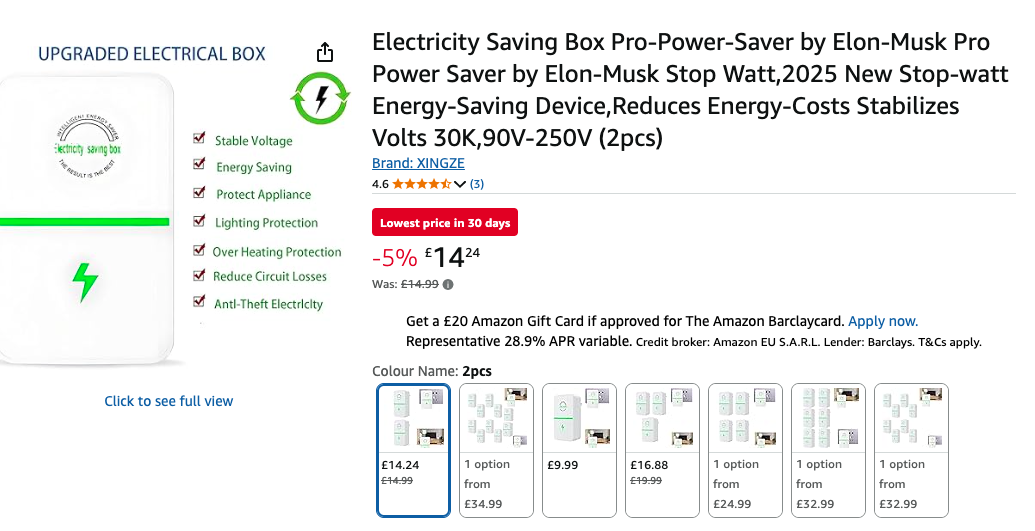With a recession looming in the US, an energy bill price rise in the UK and a cost-of-living crisis just about everywhere, household incomes are being stretched further than our credulity over tariff maths.
You can’t blame anyone for resorting to desperate measures to pay the bills and, of course, there are plenty of people trying to capitalise on this desperation.
If you spend any time on Tiktok, Facebook or Instagram, you may have seen the outrageous claims made over “electricity-saving boxes”, which are alleged to make your home electricity consumption magically more efficient and save you huge amounts of cash.
And all this for just $19.99/£14.99.
Suspicious? Good. I’ll continue. The ads and reels variously assert that the device was invented by Nikola Tesla or backed by Elon Musk (which you’d imagine would be off-putting enough) or that it works thanks to some nonsense about sine waves.

Amazon
When you’ve returned your eyebrows to their correct place, I can tell you that the secret that “energy companies don’t want you to know about” is a little plastic box that categorically will not save you any electricity but may instead burn your house down.
UK consumer watchdog Which? tested eight of the devices, which you can find on sale from Amazon, Temu and AliExpress, but which I won’t link to, for obvious reasons.
Best case scenario, you plug it in, a light on the box comes on – and that’s it. Worst case, it may start a fire or give you an electric shock as the devices tend to be so poorly constructed that they’re actually illegal to sell in the UK.
So, don’t buy one of those. But what can you do instead?
There’s no instant solution that’ll drastically lower your bills – but there are habits that people can adopt to that will reduce their bill more than enough to offset the latest rise. Let’s assume that your home is as insulated and draught-proofed as possible, and that you’re thrifty with the heating and A/C and never leave either one running when you go out.
- One of the biggest ways to save is to stop leaving devices on standby. Only switch them on when you’re using them. Any smart or remote-controlled devices will have a standby mode and it’s tempting to consider standby mode as off – but it’s not the same thing. If the plug is too difficult to reach, plug it into a smart plug, then the wall. A smart plug will also let you schedule times to turn it on.
- Don’t charge your devices overnight. Plug them in when you’re nearby and set an alarm on your phone to remind you to unplug them as soon as they’re charged.
- Wash your clothes using cool water, and only ever wash a full load.
- Air-dry your clothes instead of using the tumble dryer.
- Don’t run the dishwasher daily. Only do it when it’s full.
- Shower instead of taking a bath – and take shorter showers. Limiting your showers to 4 minutes at a time could save you £60 a year, according to the Energy Saving Trust.
- Descale your kettle. Don’t overfill it when you use it. Only add the amount of water you need when making tea or coffee.
- Defrost your fridge and freezer regularly. If you tend to empty your freezer between shopping trips, fill the empty space with plastic bottles of water to make it run more efficiently. If you let it empty, it’ll have to work harder to remain cool.
- Switch out any light bulbs for energy-efficient ones.
- Finally, switch off the lights when you leave a room. It’s so obvious but it’s easy to forget.
Want to cook more efficiently? You need an air fryer. We’ve got recommendations for the best Ninja air fryers, the best dual-drawer models, the best air fryer ovens and the best air fryers overall.







